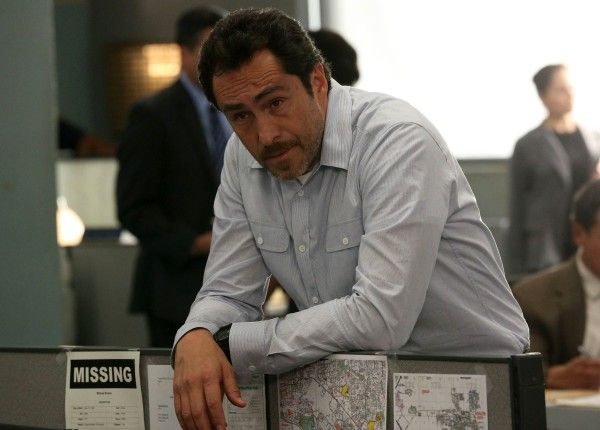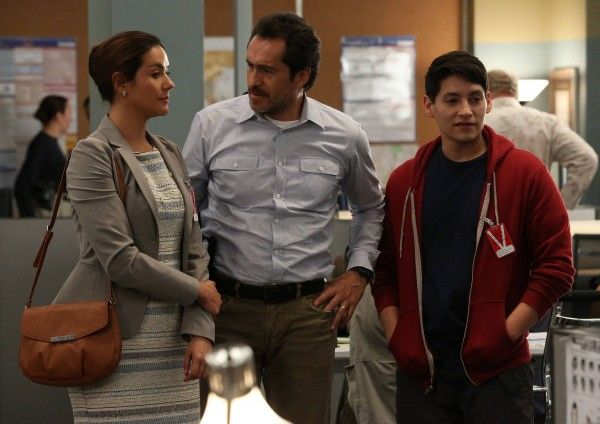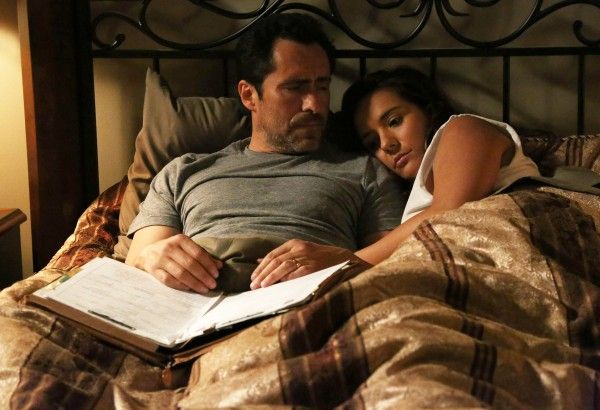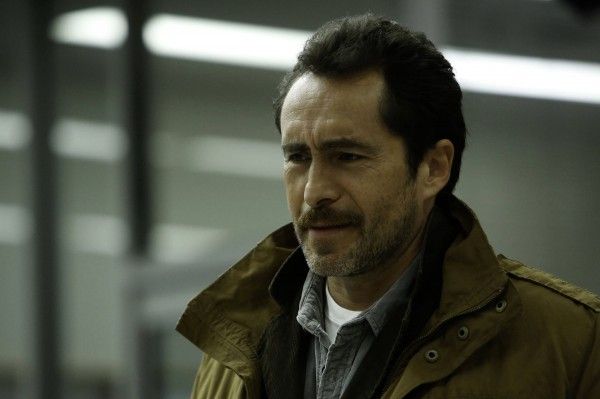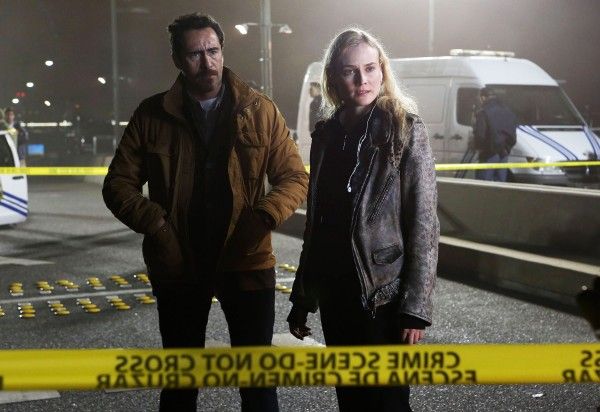The FX drama series The Bridge, adapted from the Scandinavian series Bron, is a present-day crime thriller that explores the tensions on the U.S.-Mexico border. When an American judge known for her anti-immigration views is found dead on the bridge connecting El Paso and Juarez, El Paso P.D. Detective Sonya Cross (Diane Kruger) must work with her Mexican counterpart, Detective Marco Ruiz (Demian Bichir), to catch a serial killer operating on both sides of the border. The show also stars Ted Levine, Annabeth Gish, Thomas M. Wright and Matthew Lillard.
During this recent interview to promote the series, actor Demian Bichir talked about what made him want to be a part of this show, the educational value of the story they’re telling, the evolution of the relationship between Marco and Sonya, the cultural differences between working in the U.S. and working in Mexico, how much he relates to his character, and what he hopes American audiences take away from watching this show. Check out what he had to say after the jump.
Question: What made you want to be a part of The Bridge?
DEMIAN BICHIR: I found a really powerful script, when I read the pilot, and then I loved the character. I loved how a Mexican cop could be filled with so many layers and so many different tones and so many different types of emotions. I just loved the fact that Marco is very, very human. Then, of course, there was the fact that Gerardo Naranjo – one of the best Mexican film makers – was going to direct the pilot. And then, Diane Kruger was also a crucial part of it because I’ve been wanting to work with her for a long time. We were going to work on a film together last January, and then it didn’t happen, for some reason. So, I was shocked to have this chance again.
This is not a documentary, but for many American viewers this might be the most that they learn about what the U.S./Mexican border is like because it’s not very well covered in the news. What do you see as the educational value of the story you’re telling?
BICHIR: We still have to go deeper, in that department. We’re not showing the real Juárez. We’re only showing the Hollywood Juárez that I guess they need to contrast to different countries. The irony of it is that Juárez is a very modern city where you can find pretty much anything you need, especially if you’ve got money. And it’s a fantastic city that I’ve known, for many years. I have family in Juárez, and friends. Every time I do a play, that’s a stop that we have to make. Juárez is a lot more than just a difficult border, but we still need to show that part. Everything we’re showing right now is only the bad side and the bad guys, but we’re also showing the bad side and the bad guys in the United States. I just hope that the rest of the world won’t take this as a fact.
So are you saying that upcoming episodes will be showing a more realistic side of Juárez?
BICHIR: Probably not in this show because this show is about contrasts. We can always give our opinions, and they listen to everything we have to say, but we don’t have any more power than that, as far as what should be seen or not. And so, in this particular story, we won’t be seeing the fantastic hospitals Juárez has, and the magnificent infrastructure that Juárez has.
Do you think it’s significant that The Bridge is airing just as the United States tries to tackle its biggest immigration reform in more than two decades?
BICHIR: I think it’s perfect timing for that because, if we can bring people’s attention to what the real problem of immigration is, then that will be an asset to our show. Even though this is not about immigration, we talk about it. Immigration is not about building walls. It’s a universal phenomenon that will continue to happen in the next 20 years, 50 years, and even more. The fact that our show is called The Bridge, that is exactly what we need. We need to build bridges and not walls. The immigration issue is about the separation of families, and that is not human, in any country in the world, but especially in the United States. We should not root for a law that separates families.
In Savages and Weeds, and in your 1996 series Nada Personal, you played characters on various sides of the law, concerning Mexican governmental corruption and the drug trade. In approaching The Bridge, how familiar were you with that landscape, and what aspect of it have you learned more about, in playing Marco?
BICHIR: That’s interesting because when we did Nada Personal, and then the same character in a second series called Demasiado Corazon, I was playing this cop that was almost like a Shakespearian character, who was always very sad and depressed, but he was a good cop. You could not buy this guy with any money. We did that in the middle of very difficult times in Mexico, 15 years ago, when all this mess began. When I did that character on that series, I got a really deep training in police procedures and the usage of all kinds of weapons, and that training helped me a lot to portray Marco now.
I believe Esteban being a high-ranked politician in Mexico was a different approach to how things work sometimes, and how difficult it is to solve many problems because high-rank officials and high-rank politicians are part of the problem. And we approached that character and that issue on Weeds with a very acidic sense of humor. We didn’t want to go into any clichés or stereotypes about these drug lords being all stupid and ignorant. Esteban Reyes was a savvy, very sophisticated, well-educated man, so we wanted to go in that direction. In Savages, Alex is the only character that is a victim of circumstances because he’s the only one who is not a killer or an assassin, or anything like that. He’s the one who dies very badly, and he’s the only educated person of that organization, working in the wrong place with the wrong people.
What I loved about Marco, when I first read the pilot, was that, out of all those characters, he is the simplest man. He is a family man. He is somebody that really believes that he can represent a difference in a very difficult world, on both sides of the border, because he works with the El Paso PD, constantly. This is not the first time he’s joined a task force. He is a character that can actually transition between heaven and hell, and be good with Dios y el Diablo. That’s a very appealing character. I was fascinated by how Marco’s private life was shown, from having a vasectomy to having problems at home with his kids and his wife. That made this character very human. This is a real human being, and he chose to stay in Juárez because he believes that he can make a difference.
Without telling you much about the future of this character, all I can say is that I’ve been getting many surprises, every time I read a new episode. We get the episodes as they’re written, and every week, we have a new one. The direction that all these characters are going, especially Marco, is pretty shocking, and that’s good drama. That’s fantastic drama. Having this story on the American television is a huge step, in terms of approaching an issue that’s right there. It will be there forever because of our vicinity, and the problems and issues that we share, as two different countries, haven’t been put on screen. Marco and Sonya represent those two countries. They are as different as Mexico and the United States, but they understand that they need to work together and get to know each other, as soon as possible, so they can cover each other’s backs and work in the same direction.
How do you see the evolution of Marco’s working relationship with Sonya, and how will things be for him at home?
BICHIR: One of the things that I love about Marco is that he is a three-dimensional character who’s not black or white. He’s a good cop and he’s a good man, but he’s no angel. I believe in characters that can be tangible, and that you can actually relate to. He loves his wife, as much as I love my wife. He’s a man who’s sometimes not very good at making decisions, and he gets himself in trouble at home, where there is already trouble. The way he communicates with his son, Gus, is rough. They don’t talk much, and that’s a problem, whenever you have a teenager. Then, there’s the relationship with Sonya. I think this is the first time that Sonya actually can have a real friend. Marco doesn’t care about anything but solving the problems that they share. And although she might be weird to Marco, he likes her and he takes care of her, just the way partners should do. So, you will see that, more and more, this relationship goes from being awkward to being very tight, without getting weird.
What has most surprised you about reactions to the show?
BICHIR: I think what shocks me the most is that I haven’t seen so many people agreeing on the same work. We have a pretty high rate on how much people like the show, whether it’s specialists, critics, common people on the streets, fellow peers or friends. Everything that I’ve heard in the last week is, “I’m hooked. I can’t wait to go back on Wednesday.”
Will this murder be solved, in the first season?
BICHIR: That’s hard to know. The original series was only one season. I haven’t seen the original series because I heard so many great things about it that I just wanted to stay away from it. I didn’t want to bring any ideas into our story, our production, or my character because I wanted this to be something new, at least for me, and to go from scratch. So, like with any film, the way Hollywood works is that, if people like it and make a bit hit of a film, chances are that you will see a sequel. If these 13 episodes are watched by a lot of people, I’m sure there will be a second, a third, a fourth, and maybe a 25th season, or maybe not. At this point, I have no idea. I don’t know what the plan is. I barely know the new episodes, as they come out from the oven, warm and nice. We’re still hoping that people will like it because that would be translated into another season. It would be really nice to see how everything develops because, from that point on, it will be our original approach because we won’t be based on anything anymore.
What do you see as the cultural differences between working in the U.S. on films and television, and working in Mexico?
BICHIR: Well, there are a few differences. Basically, as an overall picture, I think we’re all the same and we do what we do things exactly the same way. The technological part of it is one that has to do with very basic things. But, I think one of the biggest differences between TV series here and Mexico is that we have a different director for every episode, and that’s a very interesting way of shooting, to say the least. It is difficult sometimes. It’s challenging. There are certain risks involved when you work like that, but I pretty much understand why they do that. When we’re shooting one episode, another director is preparing the next episode because you wouldn’t be able to prepare, if you were shooting every episode, as a director. So, changing directors in every episode is probably the biggest challenge.
How much of Marco do you relate to, on a basic level?
BICHIR: We are alike, in terms of being passionate about life and what we do. We love our work, and we love our family.
What message would you like American audiences to take from The Bridge?
BICHIR: I don’t know. I think I’d like people to fall in love with the story and get hooked on it because they’re moved and touched. There are many issues that are very sensitive, and many things that remind us that Mexico and the United States are very close together. I hope people can stop believing everything politicians say about Mexico and the United States, and the problems that we share. I hope that maybe we can ignite some kind of curiosity, so people can dive into more information about many issues, not only immigration, but also the way we work as two different countries so close together. If we’re lucky, The Bridge could do that. Maybe we could bring people’s attention to what Aspergers is. Sometimes a good film, a good book or a good series can make you a better person. Maybe if we’re lucky, we will make you curious about many issues, like the way politicians lie, why they are passing this new immigration law, and why there is a new chance for amnesty, but at the same time, they want to build this huge wall. Why do they want to use our tax money to build a wall? Haven’t we learned that there is no wall high enough to stop immigration? That is not the issue. So, we need to know the facts, in order to tell the politicians, “Excuse me, I don’t want you to use my money on building a wall that is not going to solve any problems. We have to go this direction instead.”
The Bridge airs on Wednesday nights on FX.

